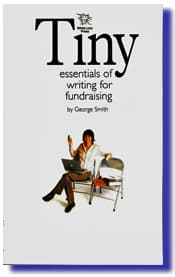Twelve suggestions – and a bit more – to help you write effectively
No one ever felt more keenly about the English language than George Orwell. He was an enemy of cant in any form and particularly waspish about the abuse of English by politicians, bureaucrats and those in power generally. No one has ever rivalled the glittering common sense George Orwell offers us in Politics and the English Language, an essay written as long ago as 1946. I am happy to quote from it extensively because its succinctness has never been bettered.
- Written by
- George Smith
- Added
- May 21, 2011

He offered as instruction a list of six questions that every writer should ask of himself or herself.
- What am I trying to say?
- What words will express it?
- What image or idiom will make it clearer?
- Is the image fresh enough to make the effect?
- Could I put it more shortly?
- Have I said anything that is avoidably ugly?
A little later on he offers an even more challenging list.
- Never use a metaphor, simile, or other figure of speech that you are used to seeing in print.
- Never use a long word where a short one will do.
- If it is possible to cut a word out, cut it out.
- Never use the passive voice when you can use the active voice.
- Never use a foreign phrase, a scientific word, or a jargon word if you can think of an everyday English equivalent.
- Break any of these rules sooner than say anything outright barbarous.
It is amusing to consider how George Orwell would react to the shoddy, useless, lazy language with which we are surrounded 60 years after he wrote this essay. For his verdict on modern writing has never been bettered.
Modern writing at its worst does not consist of picking out words for the sake of their meaning and inventing images to make the meaning clearer. It consists of gumming together long strips of words, which have already been set in order by someone else, and making the results presentable by sheer humbug.
How much fundraising copy can escape this Orwellian verdict?
And now George Smith, himself, on the practice of writing.
I have listed what Orwell told us about writing in general. It is now time to get closer to our own particular demands in writing fundraising copy. If it checks out with Orwell from time to time, do not be the least surprised, for it is my strongly-held belief that fundraising communication does not need its own specially fabricated language.
1. Use Saxon words, not Latin ones
Ninety-five per cent of words in the English language come from either Saxon or Latin roots. The former are shorter and, therefore, better. Look at these familiar alternatives
| Latin | Saxon |
| Information | News, facts |
| Indicate | Show |
| Immediately | Now, right away |
| Construct | Build, make |
| Discover | Find |
The Saxon words have more force. If you don’t believe me, try swearing with Latin-based oaths.
2. Use vivid words and not hackneyed ones
Sounds obvious, doesn’t it? But I suggest that you challenge your next piece of fundraising copy in these terms. Start with the reply device, then look at the body copy of an ad or the text of a letter. How many times could you have used a substitute word to greater point?
Nothing need be sacred. Back in the 1970s the only tax-effective charity gift in Britain was called a covenant, a four-year regular commitment by the donor that qualified for tax relief. The covenant form always loyally bore the heading ‘Covenant Form’. Until we changed it – perfectly legally – to ‘Tax Recovery Form’. Response accelerated immediately.
3. Use short sentences and vary the lengths
The full stop is there for a reason. It helps people understand what you are saying by chopping your text into bite-sized pieces called sentences. Remember nothing else matters except meaning, A sentence does not need a verb. Not at all. It need not defer to the Johnsonian tradition of the periodic sentence that ran to perhaps 200 words complete with sub-clauses and the full complement of colons and semicolons to separate the various constructs, a tradition that continued in the hands of writers such as Henry James, an author who rarely deployed 20 words when 200 could fulfil his sense of personal grandeur, a quality that some may admire but which most would resist on the basis that there are only so many hours in the day in which to read a novel.
Did you fall asleep during that last sentence? Good. I have made my point. A long sentence is not just damned hard work, it also provokes the language of pomposity and self-regard. Short sentences are more appropriate to fundraising. Like this. But not always. Boredom sets in. Truly it does. Honestly. See what I mean?
And I play these games because the short and verb-free sentence has become just a little bit of a cliché in its own right. Sentence length should be varied. It helps the reader understand what you are trying to say. That’s all.
4. Use short paragraphs and vary the lengths

A similar but separate point. You can create a powerful paragraph out of just one sentence. But if every paragraph – or succeeding paragraphs – is so leanly constructed, then the power is lost and the ghost of professional technique begins to haunt your message.
Avoid the temptation to write snappy little paragraphs like these.
They can work. But not always.
In fact, they can be boring.
And I hope the paragraphs above prove the point. The paragraph I am writing now is, ironically, much easier for you to read. It is also more courteous, for short sentences in short paragraphs have a habit of sounding like slogans.
5. Get to the point!
You are a charity. People expect you to be asking for money. So, do not delay the primary reason for communicating. Do not feel that you have to lead up to your vulgar request via 200 words of self-justification, for nothing is more tiresome than an over-long preamble to a predictable request. Would a tax demand be more acceptable if it offered a couple of paragraphs about the history of the Inland Revenue, or an update on the trade deficit?
6. Get real!
There is a certain kind of letter that only exists as an appeals letter. It has two or four pages, it has a PS and, quite often, a PPS. It may have photographs interspersed in the text and it will certainly make full play with the available type styles. It will make an important point by slipping into italics so that your eye is directed to the sentence in question. It will make a very important point by using a bold face so that its importance is hammered home. Or it will underline something so that you fully understand what is being said. Combinations of two or three of these typographic variants are not unknown.
7. Use active verbs and not passive ones
A direct echo of Orwell, I know, but charities do have a habit of slipping into the passive voice. But this reversal of subject and object can be very confusing and tiresome. And it certainly smacks of bureaucracy where, ‘Your letter has been received’ will always be preferred to ‘We have received your letter.’
Charities need the vigour of the active voice. Compare and contrast,
Your tents will be sent to Kurdistan as a matter of urgency.
with
We must send those tents to Kurdistan urgently.
8. Relate the story to the reader.
‘Give to others less fortunate than yourselves’ is one of the very oldest of fundraising mantras but it is a sound one still. You have to be a little more linguistically subtle, of course, these days and you should always avoid the outright mawkishness that can creep in. A sentence like, ‘Think of those Ethiopian children as you tuck your own little ones up in bed at night’ would not play well these days, nor deserve to.
We are all surrounded by half-appreciated, half-digested facts that we relegate to the back of our minds. Good fundraising copy can promote them to the front. And it does no harm to be as personal as possible. ‘One in three of the population will suffer from cancer’, or, ‘Ninety per cent of us will suffer from arthritis’ are chastening and provocative sentences.
But, ‘One in three of us will suffer from cancer’, or “Your chances of escaping arthritis are just one in 10’ are that much more challenging because the third person has been replaced by the second person and an objective fact has been given subjective power.
And there is nothing ethically wrong with pushing the point to its logical most personal extreme.
One in three of your friends and family will suffer from cancer,
or
Help us find a cure for arthritis before you get it.
No falsehoods are being deployed here. We have simply given the truth more power.
9. Ask for money and not resources
We don’t seem to be comfortable with the simpler vocabulary of yesteryear. Hence our self-consciousness about the M word. Politicians have invented the word ‘resources’ to prevent them saying ‘money’ out loud and frightening the voters, for it sounds more mystical, less personally demanding. It goes without saying that charities have also begun to talk of resources. I have already received a mailing that talks of nothing else but the charity’s need for ‘more resources’, I was tempted to offer a couple of old shirts and some faded typewriter ribbons.
The word is money. Not support, or help, or contribution, or commitment (though each of these words has a place in a fundraiser’s vocabulary). And it is extraordinary how seldom it is used.
Remember Bob Geldof’s’ appeal to the nation with Band Aid in 1984? He did not say, ‘We need all the resources we can command.’ He said, ‘Send us the f****** money.’
I rest my case.
10. Use ‘I’ and ‘you’
Avoid the first person plural unless it is totally necessary – and it rarely is. This is a commonplace instruction for letter-writing on the obvious basis that letters should be seen to be completely individual communications between two human beings. But I am not sure that the I/you habit should be dropped from other parts of the communication. Why should an accompanying leaflet slip into a more formal and objective mode?
We are fortunate in English in using the pronoun ‘you’ in both singular and plural forms. But the second person plural can still make an accidental appearance in fundraising. ‘Dear friends’ is a terrible way to start a letter. And do watch out for that corporate royal ‘we’. ‘We at the Royal Bank’ is an appalling piece of pomp-speak. But ‘we at Oxfam’, or ‘we in the environmental movement’ are even worse for they suggest good causes adopting the verbal mores of corporations – not what most donors want to hear.
11. Does it sound like someone talking? If not, why not?
Fundraisers really have no excuse for communicating in other than acceptable human speech. Great issues do not need hysteria to be seen as great issues; the perception of need is not strengthened by the shrill language of the marketplace. We need passion, we need honesty and conviction, we need emotion, authority and urgency. We should not need verbal tricks.
There is one true test of whether your fundraising copy is effective. Read it out loud – to a colleague, your partner, or whoever. If they burst out laughing, you have written parody copy. If they fall silent, you have made an effect. If they threaten to blub, you have hit the jackpot.
All fundraising copy should sound like someone talking. Accept that and you will find that it is easier to write than the kind of inbred gibberish that so often scars an appeal.
12. Blah, blah, blah
Most fundraising appeals have too many words. The letter is usually longer than it needs to be and probably suffers from those ritualistic PSs. And we surround it with a leaflet or brochure as a further act of deference to the norm. Maybe we include a second letter by way of third-party endorsement. We certainly include that response device with its tick boxes, shopping list and other verbal rituals – and these days we will probably write copy on the back of it. Before we take stock, we have already used up perhaps 1,500 to 2,000 words to make our case. It is a tribute to the energy of the copywriter, but such verbosity should not be confused with good communication.
Yes, we write too many words. We spend endless time debating the nuances of those words. And we miss the only point that matters. It is sad but increasingly true – people do not read these words that we compile so assiduously. Indeed, they are bored witless at the slight of them. The whole world is slipping into a post-verbal state where succinctness is seen as a greater virtue than coherence, the new world of the soundbite. Verbosity is suddenly a very old-fashioned practice restricted to charity mailings and, I guess, politicians.
© George Smith 2008


















